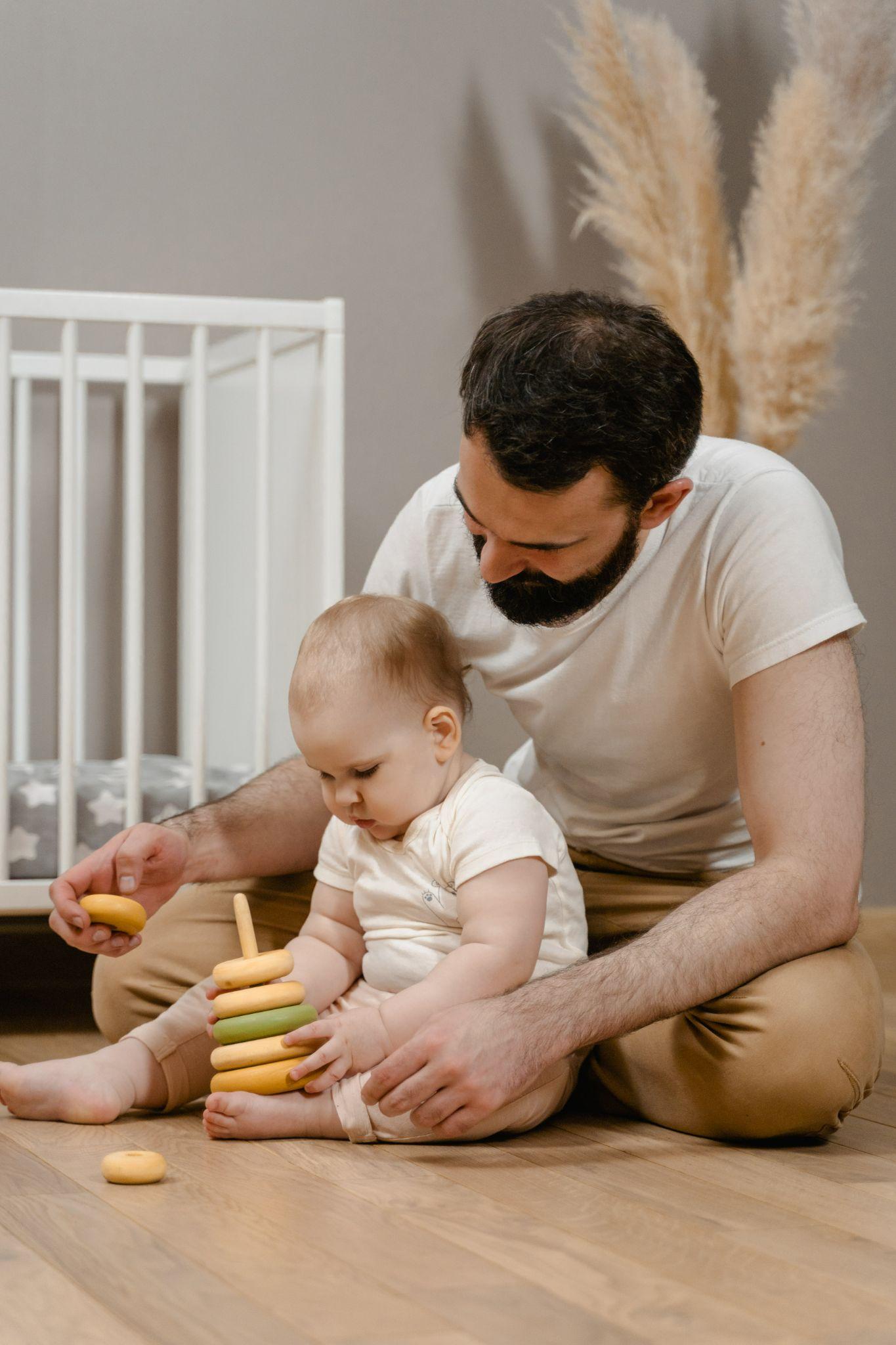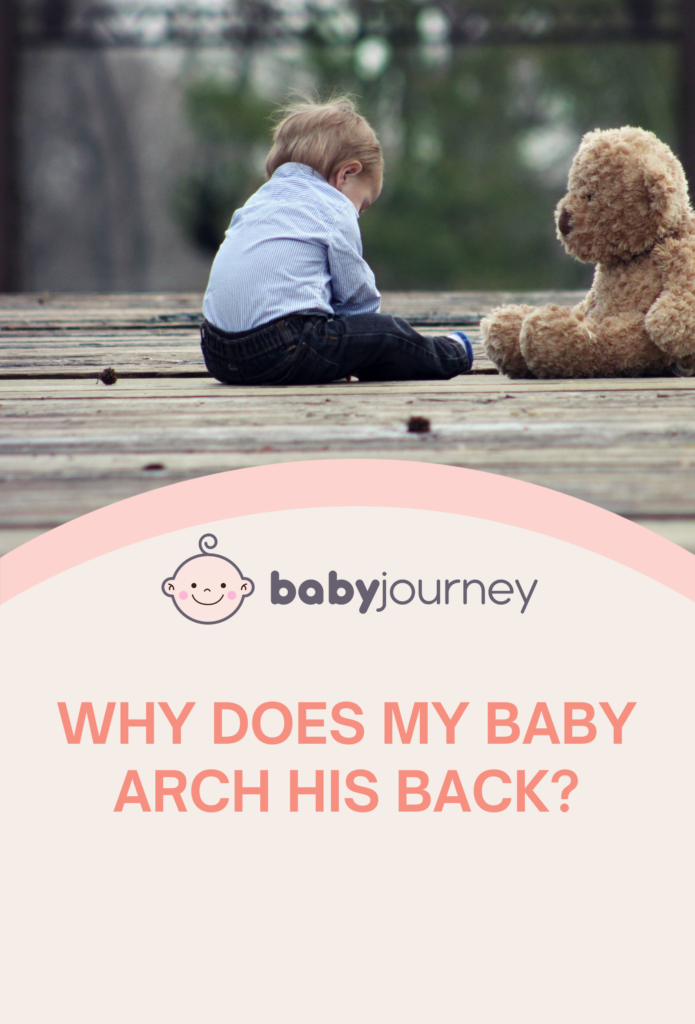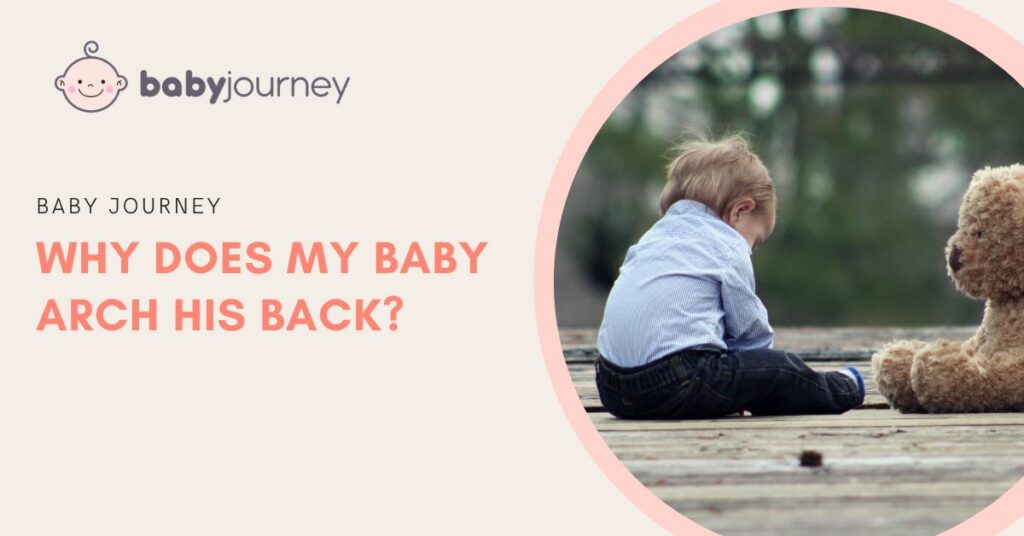Why do babies arch their back? Babies are known to make a variety of movements and sounds as they grow and develop. One common behavior that parents may notice is their baby arching their back. While this behavior is usually harmless, it can be a cause for concern in some cases. Understanding why babies arch their backs can help parents determine if further action is necessary.
There are a few reasons why babies may arch their backs. One common cause is simply a way for them to communicate their needs or discomfort. For example, if a baby is hungry or has a wet diaper, they may arch their back to signal to their caregiver that they need attention. Additionally, some babies may arch their backs as a reflexive motion in response to something, such as a sudden loud noise or bright light.
However, in some cases, back arching can be a symptom of a more serious medical condition. For example, babies with reflux or colic may arch their backs in response to the discomfort caused by these conditions. Cerebral palsy and other neurological disorders can also cause back arching in babies. It is important for parents to be aware of the potential causes of back arching in young babies and to seek medical attention if they have any concerns about their baby’s behavior.
- Understanding Baby's Body Language
- Common Reasons Why Babies Arch Their Back
- Health Conditions Related to Back Arching
- When to Consult a Pediatrician
- Managing and Preventing Back Arching
- Conclusion
- Frequently Asked Questions
- What are some possible reasons for a baby to arch their back?
- Is arching the back a normal behavior for babies?
- How can I tell if my baby's back arching is a sign of discomfort or pain?
- Can reflux or colic cause a baby to arch their back?
- What can I do to help my baby when they arch their back?
- At what age should a baby stop arching their back?
Understanding Baby’s Body Language

Babies communicate through body language, and arching of the back is a common movement that can convey different messages depending on the context. Understanding baby’s body language is crucial for parents to respond to their needs and feelings appropriately.
When a baby arches their back, it can indicate discomfort, pain, or an attempt to communicate something. Here are some possible reasons why a baby may arch their back:
- Discomfort or pain: A baby may arch their back as a response to discomfort or pain, such as gas, reflux, or constipation. In these cases, the baby may also cry, fuss, or pull their legs up to their chest.
- Overstimulation or colic: Babies who are overstimulated or experiencing colic may arch their back as a way to release tension or frustration. This behavior is usually accompanied by crying, fussiness, or other signs of distress.
- Building muscles and motor skills: Arching of the back can also be a sign that the baby is working on building their muscles and developing their motor skills. Babies may arch their back during tummy time or when trying to crawl or sit up.
- Sleeping, nursing, eating, and teething: Babies may also arch their back during sleep, nursing, eating, or teething. In these cases, the behavior is usually temporary and not a cause for concern.
It’s important for parents to observe their baby’s body language and cues to determine the reason behind their back arching. If the behavior is accompanied by other signs of distress, such as crying, fussiness, or refusal to eat, it may be a sign of an underlying issue that requires medical attention.
In summary, understanding baby’s body language can help parents respond to their needs and feelings appropriately. Arching of the back is a common movement that can convey different messages depending on the context, and parents should observe their baby’s behavior and cues to determine the reason behind it.
Common Reasons Why Babies Arch Their Back

Babies arch their backs for various reasons, and it is a common behavior among infants. Understanding the reasons behind this behavior can help parents address any underlying issues and provide appropriate care for their little ones. Here are some of the common reasons why babies arch their backs:
Feeding Issues
Babies may arch their backs during or after feeding due to various issues, such as reflux, heartburn, or an upset stomach. Gastroesophageal reflux (GERD) is a common condition in infants, which occurs when the stomach contents flow back into the esophagus, causing discomfort and pain. If your baby is arching their back during or after feeding, it could be a sign of reflux or heartburn, and you may need to adjust their feeding routine or consult a doctor.
Discomfort and Pain
Babies may also arch their backs due to discomfort or pain, such as gas, colic, or teething. Gassiness can cause discomfort and bloating, leading babies to arch their backs to relieve the pressure. Colic is another common condition that can cause babies to arch their backs due to frustration and stress. Teething can also cause discomfort and irritability, leading babies to arch their backs as a way to cope with the pain.
Tiredness and Overstimulation
Babies may also arch their backs when they are tired or overstimulated. When babies are tired, they may arch their backs as a way to control their movements and try to fall asleep. Overstimulation can also cause babies to arch their backs as a way to express their emotions and seek attention.
Communication and Attention Seeking
Babies may also arch their backs as a way to communicate their emotions or seek attention. When babies are upset or angry, they may arch their backs as a way to express their frustration or anger. Babies may also arch their backs to seek attention from their parents or caregivers.
In conclusion, babies arch their backs for various reasons, and it is a common behavior among infants. Parents should pay attention to their baby’s behavior and try to identify any underlying issues that may be causing this behavior. If you are concerned about your baby’s arching behavior, you should consult a doctor to rule out any cause for concern.
Health Conditions Related to Back Arching

Babies arching their backs can be a sign of various health conditions. In some cases, it may be a normal developmental phase, but in other cases, it can be a sign of a serious medical condition. Here are some of the health conditions related to back arching in babies:
Gastroesophageal Reflux Disease (GERD)
GERD is a health condition that occurs when stomach acid flows back into the esophagus. This can cause irritation and inflammation, leading to symptoms such as arching of the back, spitting up, and crying. GERD is relatively common in infants and can be managed with medication and lifestyle changes.
Autism
Autism is a developmental disorder that affects social interaction, communication, and behavior. Some children with autism may arch their backs as a form of self-stimulation. Other signs of autism may include delayed speech and motor development, lack of eye contact, and repetitive behaviors.
Cerebral Palsy
Cerebral palsy is a group of disorders that affect movement and muscle tone. It is caused by brain damage that occurs before, during, or shortly after birth. Babies with cerebral palsy may arch their backs due to increased muscle tone or spasticity. Other signs of cerebral palsy may include delayed motor development, poor coordination, and seizures.
Seizures
Seizures are a neurological disorder that occurs when there is abnormal electrical activity in the brain. Babies with seizures may arch their backs as a result of muscle contractions or spasms. Other signs of seizures may include staring, jerking movements, and loss of consciousness.
It is important to note that back arching alone is not a definitive sign of any of these conditions. If a baby is arching their back frequently or in combination with other symptoms, it is important to consult a doctor or pediatrician for an evaluation.
When to Consult a Pediatrician

If a baby is consistently arching their back, it is important to consult with a pediatrician. While it is normal for babies to arch their backs occasionally, persistent arching may be a sign of an underlying health condition. Here are some situations when consulting with a pediatrician is recommended:
- If the baby is arching their back while feeding, it could be a sign of acid reflux or gastroesophageal reflux disease (GERD). A pediatrician can help diagnose and treat these conditions.
- If the baby is arching their back while crying or screaming, it could be a sign of pain or discomfort. This could be due to a serious medical condition, such as intestinal blockage or nerve damage. A pediatrician can help diagnose and treat these conditions.
- If the baby is experiencing seizures or has increased muscle tone, it is important to consult with a pediatrician. These symptoms could be a sign of cerebral palsy or other serious medical conditions.
- If the baby has low muscle tone or is not meeting developmental milestones, it is important to consult with a pediatrician. These symptoms could be a sign of autism or brain damage.
- If the baby is experiencing sleep apnea or apnea-like symptoms, it is important to consult with a pediatrician. These symptoms could be a sign of Sandifer syndrome, infantile spasms, or other serious medical conditions.
- If the baby has jaundice or is at risk of developing kernicterus, it is important to consult with a pediatrician. These conditions can cause brain damage if left untreated.
It is important to note that persistent back arching does not always indicate a serious medical condition. However, consulting with a pediatrician can help rule out any underlying health issues and provide peace of mind for parents.
Managing and Preventing Back Arching

If your baby is arching their back frequently, there are several strategies you can use to help manage and prevent this behavior. By understanding the reasons behind your baby’s back arching, you can take steps to address their needs and help them feel more comfortable and content.
Feeding Techniques
One common reason for back arching is hunger or discomfort during feeding. To prevent this, try adjusting your feeding techniques. For example, if you are breastfeeding, make sure your baby is latching on correctly and getting enough milk. If you are bottle-feeding, make sure the nipple size is appropriate for your baby’s age and that they are not taking in too much air.
Comforting Strategies
When your baby is upset or uncomfortable, they may arch their back as a way of expressing their distress. To help soothe your baby and prevent back arching, try comforting strategies such as cuddling, rocking, or swaddling. You can also try using a pacifier, singing or playing soft music, or providing gentle massage.
Creating a Calm Environment
Your baby’s environment can also play a role in their behavior. To prevent back arching, try creating a calm and soothing environment for your baby. This may include dimming the lights, reducing noise and stimulation, and providing a comfortable and safe space for your baby to rest and play.
Routine and Predictability
Babies thrive on routine and predictability, so establishing a regular schedule can help prevent back arching and other behaviors related to stress or frustration. Try to establish regular feeding, sleeping, and play times, and stick to a consistent routine as much as possible.
By using these strategies, you can help manage and prevent back arching in your baby. However, if your baby’s back arching persists or is accompanied by other symptoms such as vomiting, fever, or breathing difficulties, it is important to seek medical attention to rule out any underlying medical conditions.
Conclusion
In conclusion, arching the back is a common behavior in babies and can be caused by a variety of factors. In most cases, it is not a cause for concern and can be resolved with simple solutions.
If a baby is arching their back during feeding, it could be a sign of reflux or discomfort. Parents can try small, frequent feedings, burping the baby frequently, and keeping the baby upright after feedings to alleviate symptoms.
If a baby is arching their back due to overstimulation, it is important for parents to provide a calm and quiet environment to help the baby relax. Swaddling, white noise, and dimming the lights can also be helpful in reducing overstimulation.
If a baby is arching their back due to tiredness, parents can try establishing a consistent sleep routine and ensuring the baby is getting enough sleep.
It is important for parents to trust their instincts and seek medical attention if they are concerned about their baby’s behavior. While arching the back is usually not a cause for concern, it can sometimes be a symptom of a more serious underlying condition.
Frequently Asked Questions
What are some possible reasons for a baby to arch their back?
There are several reasons why a baby may arch their back, including gas, reflux, building muscles and motor skills, being overstimulated or colicky, and teething. In some cases, it may also be a sign of a neurological condition such as cerebral palsy.
Is arching the back a normal behavior for babies?
It depends on the context. Babies may arch their back during play or while trying to roll over, which is a normal part of their development. However, if the arching is accompanied by crying or other signs of discomfort, it may be a cause for concern.
How can I tell if my baby’s back arching is a sign of discomfort or pain?
If your baby is arching their back and crying or seems uncomfortable, it may be a sign of discomfort or pain. You can try to soothe them by holding them, rocking them, or offering them a pacifier. If the behavior persists or is accompanied by other symptoms such as vomiting or fever, it’s best to contact your healthcare provider.
Can reflux or colic cause a baby to arch their back?
Yes, reflux and colic are common causes of back arching in babies. Reflux occurs when stomach acid flows back into the esophagus, causing discomfort and pain. Colic is a condition characterized by excessive crying and fussiness, often without an apparent cause.
What can I do to help my baby when they arch their back?
If your baby is arching their back due to discomfort or pain, there are several things you can do to help them. Offer them a pacifier, hold them upright, or try gentle massage or tummy time. If the behavior persists or is accompanied by other symptoms, it’s best to contact your healthcare provider.
At what age should a baby stop arching their back?
Babies may arch their back at different stages of their development, but typically this behavior decreases as they gain more control over their muscles and become more mobile. If you’re concerned about your baby’s back arching behavior, it’s best to talk to your healthcare provider to rule out any underlying medical conditions.




